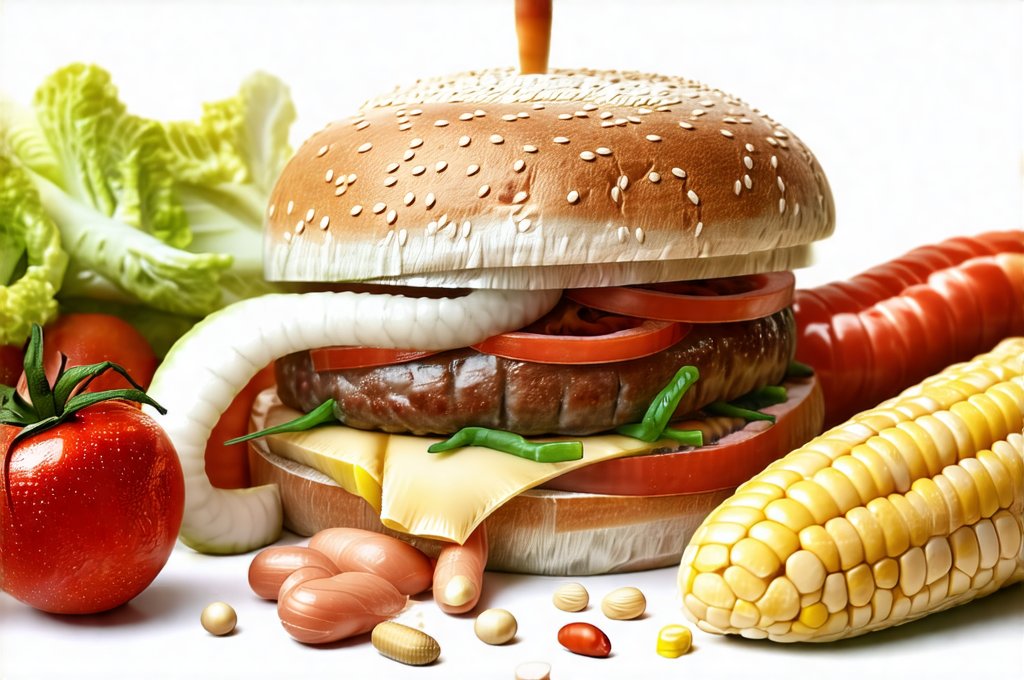The modern food landscape is dominated by processed foods, offering convenience and affordability but often at a hidden cost – our digestive health. For decades, we’ve been told that dietary fat was the enemy, leading to a surge in low-fat, highly processed alternatives laden with sugars, artificial ingredients, and refined carbohydrates. This shift, coupled with increasingly busy lifestyles and decreased consumption of whole, natural foods, has fundamentally altered our gut microbiome and contributed to a widespread rise in digestive discomfort, from bloating and gas to more serious conditions like irritable bowel syndrome (IBS) and inflammatory bowel disease (IBD). Understanding the intricate relationship between processed food, artificial additives, and long-term digestive imbalance is crucial for regaining control of our health and well-being.
The issue isn’t necessarily about eliminating all convenience foods entirely; it’s about understanding what constitutes processing and the impact these modifications have on our bodies. While some processing – like freezing vegetables or fermenting yogurt – can preserve nutrients and even enhance digestibility, the vast majority of processed food undergoes extensive manipulation that strips away essential fiber, vitamins, and minerals while adding ingredients that actively disrupt digestive function. These additions often include emulsifiers, preservatives, artificial sweeteners, and flavor enhancers, all designed to extend shelf life, improve palatability, or reduce production costs – but at a significant trade-off for our gut health. This imbalance doesn’t happen overnight; it’s the cumulative effect of years of consuming these foods that gradually erodes our digestive resilience and leaves us vulnerable to chronic discomfort. It is important to understand why skipping meals may lead to digestive imbalance as well, because consistent eating patterns are key for gut health.
The Impact of Processing on Nutrient Density and Fiber Content
Processing fundamentally alters the nutritional profile of food, often removing vital components essential for optimal digestion. – Fiber is a prime example; it’s largely removed during the refining process, leaving behind empty calories that offer little to no benefit. This lack of fiber disrupts the natural rhythm of our digestive system, leading to constipation, irregular bowel movements and an increased risk of developing diverticulitis. Fiber isn’t just about “roughage” though; it feeds beneficial gut bacteria, promoting a diverse and thriving microbiome which is essential for overall health. – Vitamins and minerals are also often lost during processing or destroyed by high-heat cooking methods. Even “fortified” processed foods rarely match the bioavailability of nutrients found in whole foods, meaning our bodies struggle to absorb and utilize them effectively. This deficiency can further compromise digestive function and weaken the immune system.
The shift from whole foods to refined carbohydrates is another significant factor. Whole grains contain bran and germ layers rich in fiber, vitamins, and minerals. Refining removes these layers, leaving behind starchy endosperm which causes rapid spikes in blood sugar levels. – These spikes trigger inflammation throughout the body, including the gut, contributing to increased intestinal permeability (often referred to as “leaky gut”). – Furthermore, refined carbohydrates are quickly digested, providing little sustained energy and often leading to cravings for more sugary or processed foods, creating a vicious cycle. This cycle not only impacts digestive health but also contributes to weight gain and other metabolic disorders.
The consequences of reduced nutrient density extend beyond simple discomfort; they impact the gut microbiome’s ability to thrive. A healthy microbiome relies on a diverse range of nutrients to support its various functions, including digestion, immune regulation, and even mental well-being. When deprived of these essential components, the microbiome becomes less resilient and more susceptible to imbalances that can lead to chronic digestive issues. Understanding the gut’s reaction to artificial food coloring and additives is important in this context, as these additions provide no nutritional benefit.
Artificial Additives: Disrupting Gut Harmony
Artificial additives are ubiquitous in processed foods, designed to enhance flavor, texture, or shelf life – but they often wreak havoc on our digestive systems. – Emulsifiers, for example, are added to stabilize mixtures of oil and water, creating a smoother texture in products like salad dressings and ice cream. However, studies have shown that certain emulsifiers can disrupt the mucus layer lining the gut, increasing intestinal permeability and promoting inflammation. This allows undigested food particles and toxins to enter the bloodstream, triggering immune responses and exacerbating digestive symptoms. – Artificial sweeteners, such as aspartame, sucralose, and saccharin, are often marketed as healthier alternatives to sugar but can have a surprisingly negative impact on gut bacteria. They disrupt the balance of the microbiome, favoring harmful species while suppressing beneficial ones. This imbalance can lead to bloating, gas, diarrhea, and even increased cravings for sugary foods.
- Preservatives, like benzoates and sulfites, are used to prevent spoilage but can also cause allergic reactions or sensitivities in some individuals. – They may also alter the composition of the gut microbiome, potentially contributing to inflammation and digestive discomfort. – Artificial colors and flavors serve no nutritional value and have been linked to hyperactivity, behavioral problems, and even digestive issues in sensitive individuals. While more research is needed, it’s clear that these additives can disrupt the delicate balance of our gut ecosystem. It’s also important to consider how to avoid digestive discomfort from condiments and sauces, as they often contain many artificial additives.
The cumulative effect of consuming multiple artificial additives over time can be significant. The constant exposure to these foreign substances overwhelms the digestive system’s capacity to process them effectively, leading to chronic inflammation and a gradual erosion of gut health. It is important to note that individuals react differently to various additives; what causes discomfort in one person may not affect another. Why gut dysbiosis can lead to histamine buildup and allergy sensitivity is a related issue, as artificial additives contribute to this imbalance.
Understanding Intestinal Permeability (Leaky Gut)
Intestinal permeability, often referred to as “leaky gut,” plays a central role in many chronic digestive issues and systemic illnesses. – Normally, the intestinal lining acts as a selective barrier, allowing nutrients to pass through while preventing harmful substances like undigested food particles, toxins, and bacteria from entering the bloodstream. – However, when this barrier is compromised, it becomes more permeable, allowing these unwanted substances to leak into circulation. This triggers an immune response, leading to inflammation throughout the body.
Several factors can contribute to increased intestinal permeability, including chronic stress, poor diet (particularly one high in processed foods and sugar), imbalances in the gut microbiome, and certain medications. – Processed foods, with their lack of fiber and abundance of artificial additives, are a major culprit. The emulsifiers mentioned earlier directly impact the mucus layer that protects the gut lining, while refined carbohydrates and sugars promote inflammation which damages intestinal cells. – When the gut becomes “leaky,” it can lead to a wide range of symptoms beyond digestive discomfort, including fatigue, skin problems, joint pain, and even autoimmune diseases.
Addressing intestinal permeability requires a multi-faceted approach, including eliminating trigger foods (processed foods, sugar, gluten), restoring a healthy gut microbiome through probiotic-rich foods and supplements, reducing stress levels, and supporting the body’s natural detoxification processes. – A diet rich in whole, unprocessed foods, fiber, and anti-inflammatory nutrients is essential for healing the gut lining and restoring its protective barrier function. Food combining principles that may ease digestive discomfort and post-meal nausea can also contribute to improving gut health.
The Role of Gut Microbiome Diversity
The gut microbiome – the trillions of bacteria, fungi, viruses, and other microorganisms that reside in our digestive tract – is a crucial determinant of overall health. – A diverse and balanced microbiome is essential for proper digestion, immune regulation, nutrient absorption, and even mental well-being. – However, modern diets high in processed foods, artificial additives, and antibiotics can significantly disrupt the delicate balance of this ecosystem, leading to dysbiosis (an imbalance in gut bacteria).
Processed foods contribute to dysbiosis in several ways. – The lack of fiber deprives beneficial bacteria of their primary food source, causing them to dwindle in numbers. – Artificial sweeteners alter the composition of the microbiome, favoring harmful species over beneficial ones. – Emulsifiers disrupt the mucus layer that protects the gut, creating an environment where undesirable bacteria can flourish.
A less diverse microbiome is more vulnerable to imbalances and less capable of performing its essential functions. This can lead to a variety of digestive symptoms, including bloating, gas, diarrhea, constipation, and abdominal pain. It also weakens the immune system, increasing susceptibility to infections and autoimmune diseases. – Restoring gut microbiome diversity requires a diet rich in prebiotic-rich foods (foods that feed beneficial bacteria), probiotic-rich foods (foods containing live cultures of beneficial bacteria), and fermented foods.
Strategies for Improving Digestive Health
Reclaiming digestive health after years of consuming processed foods requires a conscious effort to prioritize whole, natural foods and support the gut microbiome. – Eliminate or significantly reduce your intake of processed foods, artificial additives, refined sugars, and unhealthy fats. Read food labels carefully and opt for whole, unprocessed alternatives whenever possible. – Increase your fiber intake by incorporating more fruits, vegetables, whole grains, legumes, and nuts into your diet. Fiber promotes regularity, feeds beneficial gut bacteria, and supports a healthy digestive system.
- Incorporate probiotic-rich foods like yogurt, kefir, sauerkraut, kimchi, and kombucha into your diet to replenish the gut microbiome with beneficial bacteria. – Consider taking a high-quality probiotic supplement, but be sure to choose one that contains a diverse range of strains and is backed by scientific research. It’s important to note that why you might feel worse when you first start probiotics — and what to do as the body adjusts. – Manage stress levels through techniques like yoga, meditation, or deep breathing exercises. Chronic stress can negatively impact digestion and exacerbate digestive symptoms. – Stay hydrated by drinking plenty of water throughout the day. Water helps move food through the digestive system and prevents constipation.
Ultimately, taking control of your digestive health requires a holistic approach that addresses both diet and lifestyle factors. By prioritizing whole, natural foods, supporting the gut microbiome, and managing stress levels, you can restore balance to your digestive system and enjoy lasting comfort and well-being. – You should also be aware that why skipping meals may lead to digestive imbalance and plan accordingly. Also, remember how to reduce digestive discomfort by improving posture during and after meals.


















